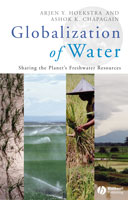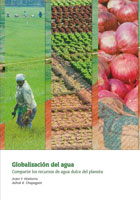Globalization of Water


Book description
Globalization of Water is a first-of-its-kind review of the critical relationship between globalization and sustainable water management. It explores the impact of international trade on local water depletion and pollution and identifies “water dependent” nations.
- Examines the critical link between water management and international trade, considering how local water depletion and pollution are often closely tied to the structure of the global economy
- Offers a consumer-based indicator of each nation’s water use: the water footprint
- Highlights the hidden link between national consumption and the use of water resources across the globe, identifying the threats facing ‘water dependent’ countries worldwide
- Questions whether trade can enhance global water use efficiency, or whether it simply shifts the environmental burden to a distant location
- Provides a state-of-the-art review and in-depth data source for a new field of knowledge
Table of contents
Preface
- Introduction
- How much water is used for producing our goods and services?
- Virtual-water flows between nations as a result of trade in agricultural and industrial products
- Water saving through international trade in agricultural products
- The water footprints of nations
- The water footprints of Morocco and the Netherlands
- Virtual- versus real-water transfers within China
- The water footprint of coffee and tea consumption
- The water footprint of cotton consumption
- Water as a geopolitical resource
- Efficient, sustainable, and equitable water use in a globalized world
Appendices
- Analytical framework for the assessment of virtual-water content, virtual-water flows, water savings, water footprints, and water dependencies
- Virtual-water flows per country related to international trade in crop, livestock, and industrial products
- National water savings and losses due to trade in agricultural products
- Water footprints of nations
- Water footprint versus water scarcity, self-sufficiency, and water import dependency per country
Glossary
References
Index
Book reviews
'An impressive development of an important idea. – Arjen Hoekstra and Ashok Chapagain - and others in their team - have since 2001 made very important modelling contributions indeed in developing the science associated with the concepts of virtual water use, virtual water 'trade' and in the related concept of water footprints. The book draws together the essentials of their research published in reports of UNESCO-IHE in Delft and in other science journals. It provides an easy introduction to the two concepts, identifies the assumptions and explains methods. The science is sound. The projection of the ideas and the analysis in the text is accessible. The concepts of virtual water and water footprints have taken some time to gain acceptance. This book will accelerate their adoption in the worlds of water science, water resources planning and allocation and in places where the uses of water resources are highly politicized. It provides an inspired introduction for newcomers to the subject.'
'The authors propose to reverse the logic of production volumes to consumption volumes. This approach entirely changes all conclusions concerning water stress in the world, dependencies on other countries, and responsibility for water scarcity. This detailed study gives new insights into these mechanisms, leading to a more realistic picture of a country’s water needs. The book contains extensive and detailed tables, with all the data required for an in depth evaluation. The book concludes with some important remarks on fairness, sustainability, responsibility, and price-setting.'
'[This book] is an authorative and stimulating book to read. Its main contribution is the excellent use of case studies to illustrate the well-articulated theoretical background of virtual water and its global implications. … A thought-provoking book.'
'The global water crisis is manifested by ground-water overdrafting, water pollution, insufficient access to safe drinking water, and regional conflicts over inadequate water supply. Indeed, scientists, engineers, water resource managers, and other professionals worldwide are working hard to deal with these problems. This new book by Hoekstra and Chapagain is a contribution to these efforts. This book describes the effects of globalization on water resources management. To be able to do this, the authors introduce new indicators such as the water footprint and other related ideas. These parameters are calculated for the period 1997-2001. In this book, the authors have used material from their research group’s earlier published papers in reputable journals. The Preface presents a good discussion on how this book differs from other similar books and why it is unique. … I recommend this book to people interested in water sustainability, for example, economists, water resources managers, policy makers, and people interested in upholding environmental justice.'
'Heightened concern about global climate change makes this book timely and of interest to many readers.'
'The main strengths of the book are its clear explanations of the core concepts and the methods used to estimate the movements of virtual water, along with the wealth of empirical evidence on specific countries, regions and commodities.'